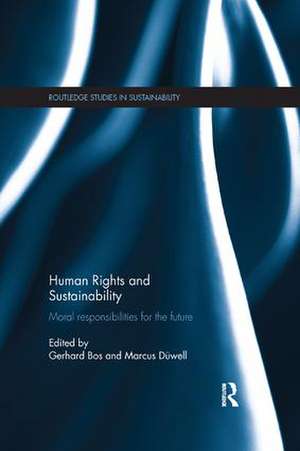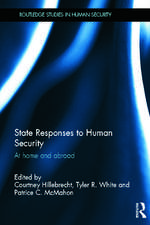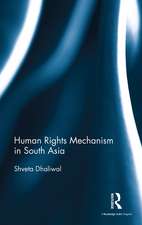Human Rights and Sustainability: Moral responsibilities for the future: Routledge Studies in Sustainability
Editat de Gerhard Bos, Marcus Düwellen Limba Engleză Paperback – 21 dec 2017
This book develops the idea of environmental obligations as long-term responsibilities in the context of human rights. It proposes that human rights require recognition that, in the face of unsustainable conduct, future human persons are exposed and vulnerable. It explores the obstacles for long-term responsibilities that human rights law provides at the level of international and national law and challenges the question of whether lifestyle restrictions are enforceable in view of liberties and levels of wellbeing typically seen as protected by human rights.
The book will be of interest to postgraduates studying Human Rights, Sustainability, Law and Philosophy.
| Toate formatele și edițiile | Preț | Express |
|---|---|---|
| Paperback (1) | 449.41 lei 6-8 săpt. | |
| Taylor & Francis – 21 dec 2017 | 449.41 lei 6-8 săpt. | |
| Hardback (1) | 1110.74 lei 6-8 săpt. | |
| Taylor & Francis – 18 feb 2016 | 1110.74 lei 6-8 săpt. |
Din seria Routledge Studies in Sustainability
-
 Preț: 280.80 lei
Preț: 280.80 lei -
 Preț: 309.65 lei
Preț: 309.65 lei -
 Preț: 304.16 lei
Preț: 304.16 lei - 20%
 Preț: 317.65 lei
Preț: 317.65 lei -
 Preț: 302.35 lei
Preț: 302.35 lei -
 Preț: 326.49 lei
Preț: 326.49 lei -
 Preț: 311.59 lei
Preț: 311.59 lei -
 Preț: 286.76 lei
Preț: 286.76 lei - 20%
 Preț: 151.87 lei
Preț: 151.87 lei -
 Preț: 340.68 lei
Preț: 340.68 lei -
 Preț: 449.41 lei
Preț: 449.41 lei - 25%
 Preț: 768.30 lei
Preț: 768.30 lei - 26%
 Preț: 765.84 lei
Preț: 765.84 lei -
 Preț: 449.41 lei
Preț: 449.41 lei - 18%
 Preț: 1000.27 lei
Preț: 1000.27 lei -
 Preț: 389.38 lei
Preț: 389.38 lei - 18%
 Preț: 1000.27 lei
Preț: 1000.27 lei - 18%
 Preț: 1000.27 lei
Preț: 1000.27 lei -
 Preț: 389.38 lei
Preț: 389.38 lei -
 Preț: 477.82 lei
Preț: 477.82 lei - 15%
 Preț: 420.64 lei
Preț: 420.64 lei - 18%
 Preț: 1000.27 lei
Preț: 1000.27 lei - 18%
 Preț: 1000.27 lei
Preț: 1000.27 lei - 18%
 Preț: 1054.71 lei
Preț: 1054.71 lei -
 Preț: 414.32 lei
Preț: 414.32 lei - 26%
 Preț: 820.71 lei
Preț: 820.71 lei - 26%
 Preț: 765.10 lei
Preț: 765.10 lei - 26%
 Preț: 764.20 lei
Preț: 764.20 lei -
 Preț: 448.06 lei
Preț: 448.06 lei - 18%
 Preț: 1109.18 lei
Preț: 1109.18 lei - 18%
 Preț: 1056.71 lei
Preț: 1056.71 lei -
 Preț: 416.22 lei
Preț: 416.22 lei - 26%
 Preț: 765.43 lei
Preț: 765.43 lei - 18%
 Preț: 1168.40 lei
Preț: 1168.40 lei - 25%
 Preț: 767.74 lei
Preț: 767.74 lei - 18%
 Preț: 1001.84 lei
Preț: 1001.84 lei - 18%
 Preț: 1110.74 lei
Preț: 1110.74 lei - 14%
 Preț: 325.34 lei
Preț: 325.34 lei - 18%
 Preț: 1003.43 lei
Preț: 1003.43 lei
Preț: 449.41 lei
Nou
Puncte Express: 674
Preț estimativ în valută:
85.99€ • 89.78$ • 71.17£
85.99€ • 89.78$ • 71.17£
Carte tipărită la comandă
Livrare economică 05-19 aprilie
Preluare comenzi: 021 569.72.76
Specificații
ISBN-13: 9780815355663
ISBN-10: 0815355661
Pagini: 240
Ilustrații: 1 Tables, black and white; 1 Illustrations, black and white
Dimensiuni: 156 x 234 x 13 mm
Greutate: 0.45 kg
Ediția:1
Editura: Taylor & Francis
Colecția Routledge
Seria Routledge Studies in Sustainability
Locul publicării:Oxford, United Kingdom
ISBN-10: 0815355661
Pagini: 240
Ilustrații: 1 Tables, black and white; 1 Illustrations, black and white
Dimensiuni: 156 x 234 x 13 mm
Greutate: 0.45 kg
Ediția:1
Editura: Taylor & Francis
Colecția Routledge
Seria Routledge Studies in Sustainability
Locul publicării:Oxford, United Kingdom
Public țintă
PostgraduateCuprins
1. Human Rights and Future People: An Introduction PART I – Obstacles and Promises in Contemporary Human Rights Law 2. Greening Human Rights Law: A Focus on the European Convention on Human Rights 3. An Atmospheric Trust to Protect the Environment for Future Generations? Reform Options for Human Rights Law 4. Avoiding the Tragedy of Human Rights: How Complex Thought May Open the Way to Recognising Human Rights for Future Generations 5. International Human Rights and Duties to Future Generations: The Role of an International Constitution PART II – Long-term Responsibility and the Theory of Human Rights 6. Human Dignity and Intergenerational Human Rights 7. Human Rights and Threats concerning Future People: A Sufficientarian Proposal Jos Philips 8. Human Rights, Climate Change, and Sustainability 9. A Chain of Status: Long-term Responsibility in the Context of Human Rights PART III – Human Rights Approaches to Sustainability 10. Human Rights as a Normative Guideline for Climate Policy 11. The Duties We Have to Future Generations: A Gewirthian Approach 12. Ecological Rights of Future Generations: A Capability Approach PART IV – Implications and Implementation 13. On Current Food Consumption and Future Generations: Is There a Moral Need to Change our Food Consumption in Order to Safeguard the Human Rights of Future Generations? 14. Climate Change and the Right to One Child 15. The Institutional Representation of Future Generations 16. Human Rights, Sustainability and Future People – A Future Discussion
Recenzii
"This is a highly valuable contribution which lays the groundwork for theorising about environmental concerns from a normative perspective and will be of great benefit to students and scholars from various backgrounds." – Intergenerational Justice Review, 2016
Descriere
The history of human rights suggests that individuals should be empowered in their natural, political, political, social and economic vulnerabilities. This book develops the idea of environmental obligations as long-term responsibilities in the context of human rights. It proposes that human rights require recognition that, in the face of unsustainable conduct, future human persons are exposed and vulnerable. It explores the obstacles for long-term responsibilities that human rights law provides at the level of international and national law and challenges the question of whether lifestyle restrictions are enforceable in view of liberties and levels of wellbeing typically seen as protected by human rights.























